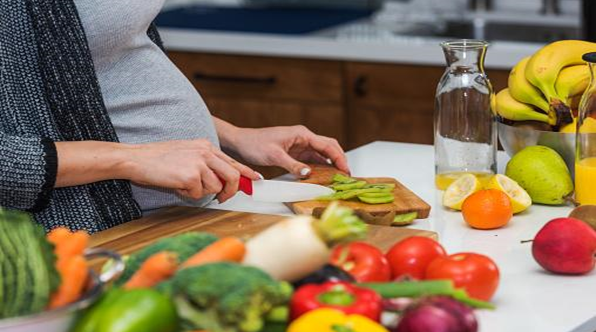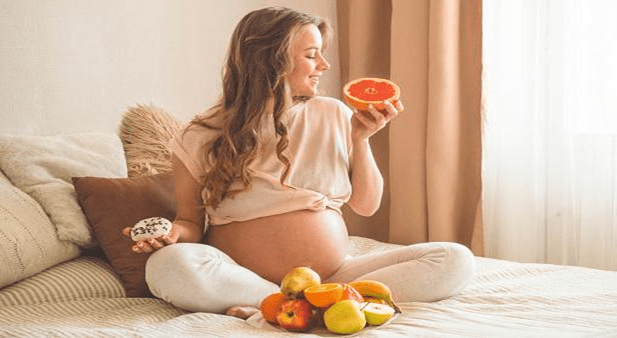
Ideal Diet during pregnancy impacts on mother and child health directly. And this article will be very helpful in knowing the best food for pregnant women’s which directly impacts on both Monther and Child health. So, lets know What Should You Eat During Pregnancy?
Healthy diet importance cannot be ignored in any condition, but when it comes to pregnancy, you have no choice but to eat healthful nutrition. Healthy nutrition improves your baby’s growth and makes your body strong. Therefore, eating nutritious food while pregnant is essential for the baby’s development and the mother’s health.
You do not need to take special nutrition, but it is essential to eat a variety of food_ vegetables, whole grains, plenty of fruits, healthy fats, protein, vitamins, and folic acid supplements. Here are some crucial foods and their importance so that you may know why these nutrients are essential for pregnancy.
A complete nutritious diet during pregnancy helps a well nourishment of mother and child as well helps to reduce the pregnancy related issues. Nutritious diet during pregnancy helps a pregnant woman to reduce the after-pregnancy energy loss.
Folic acid is a B vitamin essential for pregnancy and when you try to become pregnant, found in green vegetables like spinach, bean, and peas. Women of childbearing age must consume 400 milligrams of folic acid recommended by the U.S. Public Health Service.
Research shows folic acid reduces the risk of neural tube defects in a baby. The incomplete development of the baby’s brain and the spinal cord are called neural tube defects. Furthermore, Folic acid plays a vital role in DNA development, tissue formation, and cell growth.
Drinking water during Pregnancy

Drinking water for around 10 to 12 glasses daily is essential when you are pregnant. Water has prominent effects on your baby’s fetus and forms an amniotic fluid around the fetus. Amniotic fluid is a clear liquid that aids in moving a baby in your Uterus shields the umbilical cord from being squeezed, works like a soft cushion to shield the baby from injury, and maintains constant temperature around your baby.
You should drink milk, fruit, and vegetable juice to fulfill the requirement of fluid in your body.
Other benefits of drinking water and juices during pregnancy
- Help in the excretion of harmful and waste products
- Maintain internal body temperature
- Transport carbohydrates and protein in the whole body
- Prevent constipation
Carbohydrates during Pregnancy
Carbohydrates are essential for the mother and baby during pregnancy. Carbohydrates break down into simple sugar, like glucose, after consumption. Glucose is a vital component for the development and growth of fetal tissue and maternal metabolism. It can move through the placenta and fulfill the baby’s requirements. You can get carbohydrates from cereals, potatoes, milk, fruits, sweet potatoes, yogurt, and rice.
To fulfill the energy requirement during pregnancy, you should eat plenty of wholegrain bread, whole meal pasta, oats, brown rice, and cereals. The carbohydrates you gain from these foods work as slow-release energy during pregnancy, and you do not feel fatigued. Additionally, they are a significant source of minerals, dietary fiber, and vitamins.
Many vegetables provide enough nutrients that are essential for a mother and her baby during pregnancy. Fresh vegetables prevent your pregnancy from severe complications like constipation and gestational diabetes as they are full of vitamins, beta carotene, fiber, and folic acid. All these nutrients play vital role in a baby’s weight development, prevent the baby from anemia, and control blood pressure.
You can eat sweet potatoes (a great source of vitamins A, B, and C), beetroot (a good source of vitamins and fiber), dark leafy green (have a large quantity of folate, carotenoid, and fiber), parsley (source of protein, riboflavin, and vitamin E) and much more vegetables to shield your pregnancy.

There is no alternative to fruits during pregnancy. Pregnant women require food rich in vitamins A and C, fiber, potassium, folic acid, and other nutrients. Fruits are packed with all these nutrients. Fruit makes women’s bodies strong until the baby’s arrival.
Hemorrhoid and digestion issues are common in pregnant women. Apple is an excellent treatment to prevent pregnancy from hemorrhoids and digestion problems If they eat an apple during pregnancy. Banana is a rich source of potassium. Potassium aids to manage pregnant women’s blood pressure and prevent leg pain during and after pregnancy.
Kiwi has a high level of folic acid, which is an excellent treatment for fetal growth defects. All Barriers, including Blueberries, Strawberries, and Raspberries are rich in antioxidants_ Antioxidants are paramount for mothers and babies to protect them from severe diseases during pregnancy.
Coconut Water During Pregnancy
Coconut water is full of refreshing taste and natural minerals which helps a pregnant woman in gaining energy as well as reduce nausea. Coconut water drinking during pregnancy by mother helps in gaining clear skin and energy to baby.
Pregnant women should avoid certain foods to ensure their health and the health of their baby. Here are some key categories to consider:
- Raw or Undercooked Seafood, Meat, and Eggs: This includes sushi, raw oysters, and undercooked chicken or beef, which can carry harmful bacteria or parasites.
- Deli Meats and Unpasteurized Dairy: These can pose a risk of listeria, a bacteria that can harm the fetus. Always opt for pasteurized products and heat deli meats before consuming.
- Certain Fish: Fish high in mercury, like shark, swordfish, king mackerel, and tilefish, should be avoided. Instead, choose low-mercury options like salmon and shrimp.
- Caffeine: High levels of caffeine can be linked to miscarriage and low birth weight. It’s generally advised to limit intake to about 200 mg per day.
- Alcohol: There is no known safe level of alcohol during pregnancy, so it’s best to avoid it entirely.
- Processed Junk Foods: High in sugar, unhealthy fats, and preservatives, these foods can lead to excessive weight gain and other health issues.
- Certain Herbal Teas and Supplements: Some herbal products may not be safe; it’s best to consult a healthcare provider before use.
Always consult with a healthcare professional for personalized dietary advice during pregnancy. An expecting mother should eat balanced food to maintain health. Your baby needs all essential nutrients during its body development_ the food that you eat aids in the development process and prevents the baby from serious disease. Therefore, you should fresh food to prevent complications in your pregnancy. Some fruits and other nutrients may be harmful during pregnancy, so you must consult a physician about your diet when you establish your diet schedule.
We hope above article will help to identify best elements for your pregnancy diet
Thanks for visiting our website
GymBag4U – Your Fitness is Our Passion
Article contribution: Abida Majeed
You may also love reading our few other articles. https://gymbag4u.com/salmonella-food-poisoning-symptoms-causes-and-treatment/ and https://gymbag4u.com/how-to-improve-digestion-health-a-comprehensive-guide/ and https://gymbag4u.com/repair-your-liver-health-conditions-a-guide-to-healthy-liver/ and https://gymbag4u.com/liver-disease-symptoms-liver-function-tests-and-treatment/
